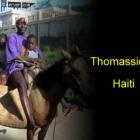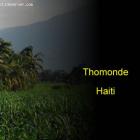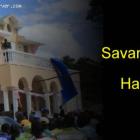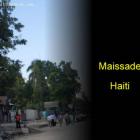ADVERTISEMENT
Slave - Haiti Observer Blog
Slave, Haiti Observer Blog. Read the following articles about Slave
Plaine-du-Nord and Saint Jacques Fiesta
Haiti's Nord Department is in the northern most part of the country. It is where the small municipality of Plaine-du-Nord, often referred to as Plèn dinò in Creole, is located. It is considered an essential part of Haitian history and is one of the centres of the voodoo religion in the country.
Plaine-du-Nord is the historical site where the battle between Haiti's French colonizers and African slaves who worked in plantations began. This led to Haiti's independence from its colonizers and the freedom of slaves who became the very first official Haitians. The municipality is currently considered as the country's Pilgrimage Festival capital, which attracts thousands of worshippers and foreign visitors yearly. One of Plain-du-Nord's biggest, most important festivals is the Saint Jacques Fiesta, which is celebrated every 25th of July. It is then followed by the Saint Anne celebration a day after. Pilgrims usually stay for 15 days in the municipality during these festivities in order to offer food to the less fortunate, light candles, and donate money to the local churches.
Happy Haiti Independence Day, this Pumpkin soup (Soup Joumou) is for you
As a reminder, Independence day in Haiti is an important holiday. we are fortunate to celebrate two important events on this day: On January 1, Haitians all over the world celebrate both New Year's Day and Independence Day.
This little nation made history on January 1, 1804 by becoming the first Black Country to gain its independence. At the same time we change the name of the country back to its original name "Ayiti", name given by the original inhabitants and before Christopher Columbus so called discovered the Island in 1492. At that point the island was named "Hispaniola"
Legal Expert Says 2011 Constitution Does Not Endanger Voodoo Faith
An on-going debate over whether the practice of voodoo is being threatened by the amended 1987 Constitution has stirred the embers of its practitioners' fears.
Voodoo, brought to Haiti by Congolese slaves, became entrenched in Haitian culture, early in its history.
In 1935, under the rule of Stenio Vincent, the 1935 Decree Law defined voodoo as a superstitious belief system and banned the practice of it. For over 50 years, the Decree Law was not tampered with. By 1987, though, the amended Constitution struck down the Decree Law with Article 297, invalidating the definition of voodoo as a superstitious practice. A presidential decree on April 4, 2003, further legitimized the voodoo faith. But in May 2011, Article 297 was annulled, and has given rise to fears that voodooists would suffer persecution for their beliefs.
The Battle Of Vertieres
The battle of Vertieres near Cap-Haitian was motivated by slaves who hat the condition under which they have been living.
Napoleon was confident that slavery would be reestablished in Saint-Domingue. General Rochambeau, who succeeded Leclerc as commander of the French army in Saint-Domingue, started implementing a series of atrocities including mass hangings and drowning of slaves suspected to be involved in insurrections.
Dessalines relentlessly attacks one town after another. He started in the South of the Country with Cayes, then Jacmel, Léogane, Jérémie, Saint Marc and Port-au-Prince. These actually set the stage for the assault on le Cap Français in the last great battle of independence in Vertieres.
Bas Limbe, Second Most Important Town In Nord Department
Bas-Limbe is located in Haiti's Nord Department. After Cap Haitien it is the second most important one in the Nord Department. In the Arrondissement of Limbe, it is a municipality. From Bas-Limbe and Limbe, Cap Haitien is located at a 26 km distance. Port Margot is at 8 km and Port-au-Prince, the capital of Haiti is at 150 km distance. French colonialists and Haitian slave battled fiercely in Limbe town.
Main Occupation
Main occupation of this town is agriculture with the winding River Limbe passing through Bas-Limbe into the sea. Coffee, bananas, mangoes and other fruits are grown here with constant water supply from the river. Vast rice pads are grown close to the sea.
The State Of Prostitution In Haiti
With the weak economy and poor living conditions in Haiti, many women, including teenagers, have settled to becoming prostitutes just to earn. Prostitution is illegal in the country but this does not stop women from getting paid for sex. Since the 1940s, prostitution rings have been active in the country and it only got worse as time went by and catastrophes hit the Caribbean nation.
According to a report in 2005, Haitian children were being trafficked in the Dominican Republic, where they were forced to work as slaves or prostitutes. Many of these children were orphaned, while others can no longer be supported and fed by their parents. As a result, they are brought to the Dominican Republic and sold to families and individuals looking for a child laborer. There were reports that the trafficked children have been physically abused too and some were so traumatized they can not recall how they got to that situation.
Our objective is to share with you news and information about Haiti and the people of Haiti. Traditions, habits and the way we were or grew are alive in this site. We highly recommend that you Subscribe to our Newsletter and also share with us some of the things that are memorable and made us unique people.


 Thomassique, Haiti
Thomassique, Haiti  Thomonde, Haiti
Thomonde, Haiti  Haitian Thanksgiving
Haitian Thanksgiving  The Town of Savanette, Haiti
The Town of Savanette, Haiti  Maissade, Haiti
Maissade, Haiti